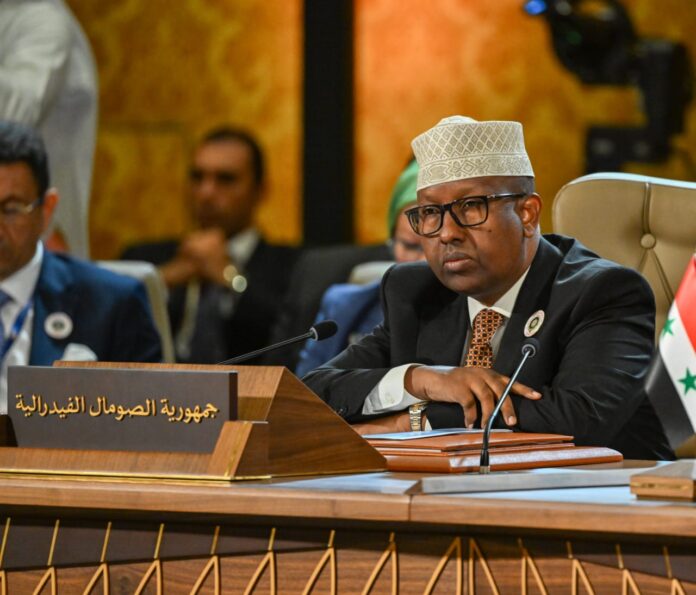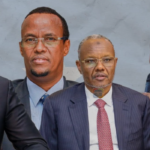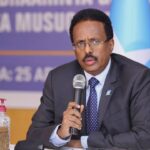NEW YORK – The Somali government has accused Addis Ababa of violating the terms of UN Security Council resolutions and overstepping its mandates as a troop-contributing member of the African Union Transition Mission in Somalia (ATMIS).
Ahmed Moallin Fiqi Ahmed, the Somali foreign minister, brought forth the accusations during a UNSC meeting on October 3, 2024, in New York.
He alleged his government had recently seized illegal weapon shipments on the Ethiopian border meant for use by non-state actors in Somalia.
During the meeting, Acting Special Representative of the Secretary-General for Somalia and Head of the UN Assistance Mission in Somalia (UNSOM) James Swan presented a report on the mission’s progress between May and September 2024.
“I remain concerned about the continuing regional tensions following the Memorandum of Understanding announced on 1 January between Ethiopia and Somaliland,” said Swan.
He urged Addis Ababa and Mogadishu to find a diplomatic solution to the impasse that has defined relations between the two for nearly a year.
“This is essential given the possible negative ramifications for stability in the region, including the potential impact on the post-ATMIS transition,” said Swan.
Other diplomatic representatives also voiced their concerns during this week’s UNSC session.
Robert Wood, alternative US representative to the UN for special political affairs, said he was deeply concerned by the rising tensions between Ethiopia and Somalia and the negative impact it is having on shared security interests.
“The United States joins the African Union and other international partners in reiterating our support for the sovereignty and territorial integrity of Somalia and rejecting any efforts to undermine it. We support Turkiye’s mediation efforts and call for dialogue to de-escalate tensions,” he said.
On the same day the UNSC convened to discuss Somalia, five countries constituting the ‘Somalia Quint’ issued a joint statement reiterating its sovereignty. These include the US, UK, UAE, Qatar, and Turkiye. Somali representatives also participated in the seventh meeting of the Quint.
“Quint partners affirmed their support for the Federal Republic of Somalia’s sovereignty, territorial integrity, and unity and reiterated the need to reduce regional tensions through dialogue, including Turkish-sponsored mediation efforts. They discussed the imperative of focusing on shared economic and security objectives, particularly to address ongoing and emerging threats from terrorist groups in the Horn of Africa,” reads the joint statement.
Swiss and Slovenian representatives also called for dialogue and the de-escalation of tensions between Ethiopia and Somalia during the UNSC session.
The UNSC urged the UN to reach a steadfast decision on the financing of the African Union Support and Stabilization Mission in Somalia (AUSSOM), the post-ATMIS peacekeeping force set to deploy in January 2025.
Swan said the fight against Al-Shabaab continues to be the key security priority for the government of Somalia and stated Mogadishu is struggling to handle the task with its own security forces.
“While making commendable efforts to sustain military operations against Al-Shabaab, Somalia is at the same time tackling the challenges of force generation; taking over security responsibilities from the African Union Transition Mission in Somalia (ATMIS); planning the transition to the proposed African Union Support and Stabilization Mission in Somalia (AUSSOM); and implementing crucial stabilization programmes in recovered areas,” he said.
Swan referred to Al-Shabaab’s August attacks on Mogadishu’s Lido Beach as evidence that the extremist group continues to pose a serious threat to security in Somalia and the wider region.
His report revealed that a total of 850 security incidents were recorded between May and September, including 126 attacks involving improvised explosive devices, resulting in at least 670 casualties. Incidents of inter-clan violence were reported in South-West, Jubbaland and Galmudug States, according to Swan.
The Somali foreign minister told the UNSC that Mogadishu is engaged in consultations with the AU and UN on the groundwork for post-ATMIS security arrangements in 2025.
Mohamed el-Amine Souef, special representative of the Chairperson of the African Union Commission for Somalia and head of ATMIS, urged for the advancement of Somalia’s Arms and Ammunition Control Procedures to prevent the proliferation of illegal weapons following the lifting of the arms embargo.
He welcomed talks between Somalia and Ethiopia to address tensions persisting between the countries since January 2024.
“While the Somali security forces had degraded Al-Shabaab’s capabilities through targeted counter-terrorism operations, the group’s asymmetric tactics in attacks against civilian and military targets in Mogadishu and across the four ATMIS sectors underscored the need for robust intelligence-sharing and sustained international cooperation,” he said.
US delegates also urged stakeholders to complete the necessary transition planning as soon as possible, calling it “critical for our shared security.”
The Russian Federation’s delegation, meanwhile, stressed that it is the Somali government which should have the “last word” in determining the parameters for the special political mission in the agreed-upon two-year period.
“We expect that the British pen holders will take into account the position of the Somali side on this issue,” said one delegate.
Japan’s representative urged a long-term perspective and a comprehensive approach based on the humanitarian-development-peace nexus — even more necessary during the critical transition of UNSOM and ATMIS.
“The proposal from the Federal Government of Somalia last month presented a reasonable two-year transition period from UNSOM to the UN Country Team, with a phased handover of responsibilities to Somali institutions,” he said.
He reiterated the need for support from neighboring ATMIS troop-contributing countries.
“There should be no room for regional tensions to give breathing space for Al-Shabaab,” said the representative.
Meanwhile on October 2, Somali President Hassan Sheikh Mohamud convened a high-level meeting of the Somali National Consultative Council (NCC), a body comprising senior members of the federal government and state administrations, to advance the Somali government’s priorities.
The discussions reportedly focused on intensifying operations against Al-Shabaab, advancing democratization, and strengthening cooperation between the Somali federal government and federal member states.
Representatives from Puntland, however, have refrained from participating in the NCC meetings since January 2023, when they declared intentions to act independently until the finalization of a new Somali constitution.







